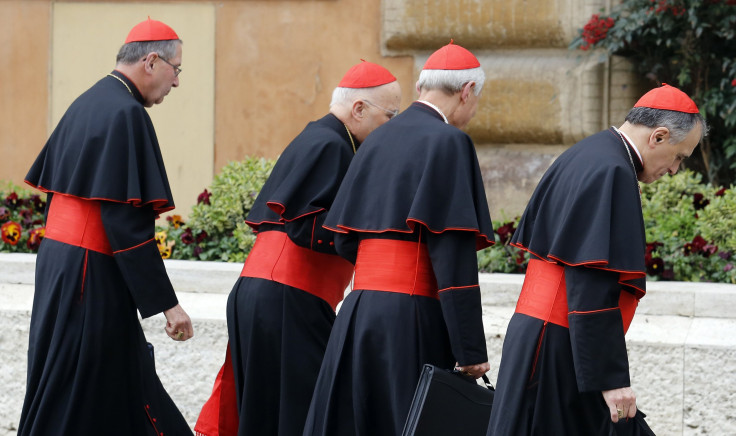Cardinal Conclave Meets At Vatican: How Do They Choose A New Pope?

Michelangelo’s famed Sistine Chapel has been closed off to tourists, suggesting that the College of Cardinals in the Vatican is getting prepared to select a new pope, following the shock resignation of Benedict XVI last month.
But there is some confusion regarding the timetable over the new election of the leader of the world’s 1.2 billion catholics.
According to reports, the Cardinals who have assembled engaged in rounds of pre-conclave meetings ahead of the election, but as of Tuesday morning no date has been fixed for the actual selection. Five of the 115 cardinal electors expected to attend the conclave still have not arrived in Rome, the Associated Press reported.
The dean of the College of Cardinals, Cardinal Angelo Sodano, stated that such a date will not be established until all cardinals have arrived in Vatican City.
The five absent cardinals are Egyptian Patriarch Antonios Naguib, and Cardinals Karl Lehmann of Germany, Jean-Baptiste Pham of Vietnam, Kazimierz Nycz of Poland and John Tong Hon of Hong Kong, the Vatican stated.
Rev. Federico Lombardi, a Vatican spokesman, said the five are expected to arrive in “the coming days.”
The Roman Catholic Church reportedly would like to see a new pontiff elected in time for Holy Week ceremonies, which commence Palm Sunday on March 24, leading up to Easter Sunday the following week.
"There was no talk about when the conclave will begin," Cardinal Francis George of Chicago said, according to the Los Angeles Times.
"We would like to be done by Holy Week, so we can have a pope and get back to our dioceses."
Another cardinal, Donald Wuerl of Washington, told the paper: "We are being told you can do pretty much what you want in terms of time frame -- this is uncharted waters for many of us."
Complicating matters is that the College will also have to discuss other important issues at the conclave, including allegations of corruption and cronyism within the Vatican itself, as well as the ongoing global scandal of sexual abuse in the Church.
Under strict orders from the outgoing Pope Benedict, the conclave will be sworn to secrecy to avoid any leaks to the press or public prior to the election of the new Holy Father -- or else they could face excommunication. Indeed, Vatican workers have been busy de-bugging rooms in the Vatican to prevent any such untoward intelligence leaks.
Speculation has arisen that the next pope may come from outside Europe, given the rising population of catholics in other parts of the world. However, European Cardinals represent a slight a majority among the current composition of the College of Cardinals.
Two of the most prominent non-European candidates for the papacy include Cardinal Luis Tagle, Archbishop of Manila, Philippines; and Cardinal Peter Turkson, from Ghana, president of the Pontifical Council for Justice and Peace.
At least one prominent cardinal will not attend the conclave: Scotland’s Cardinal O’Brien, the most senior Catholic Church official in the UK, who resigned as archbishop of St. Andrews and Edinburgh over the weekend after four men accused him of improper behavior. The 74-year-old prelate will now face a Vatican probe and could be vulnerable to further punishment should wrongdoing be proven.
O’Brien is the first cardinal ever to miss a conclave due to a personal scandal.
"We can't spend all week talking about O'Brien," Lombardi told reporters.
In any case, once the cardinals get down to voting, they will each present their choice by a secret paper ballot. A cardinal needs two-thirds majority to become pope. In the event no winner is selected, the vote is conducted again the following day.
If no pope is picked on the third day, the cardinals break for a day of prayer and consultations.
Under rules established by Pope John Paul II, voting can extend another seven rounds. If no new pope is selected by then, the voting threshold is reduced to 50 percent plus one vote.
The outside world will know of the conclave’s progress (or lack thereof) by the color of the smoke that arises from the chimney in the chapel. Black smoke indicates that no pope has been elected, while white smoke means that a new Holy Father has been named -- special chemicals are added to the fireplace in the chapel to determine the smoke’s color.
© Copyright IBTimes 2024. All rights reserved.











